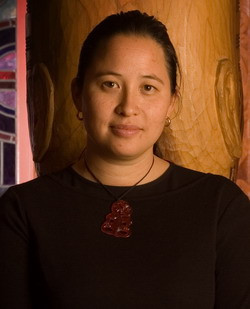Emerging Māori neuroscientist Dr Melanie Cheung (Ngāti Rangitihi, Te Arawa) has been awarded nearly $1.2 million from the Health Research Council of New Zealand (HRC) to slow the progression of Huntington’s disease using innovative, Māori-focused brain training.
Dr Cheung will use her 2014 HRC Rangahau Hauora Project grant to measure the effectiveness of the special brain resilience training programme that she and her team have developed in partnership with the Brain Plasticity Institute in San Francisco, US.
The University of Auckland-based researcher, who is a recipient of the HRC’s Eru Pomare Research Fellowship in Māori Health, is currently at the Brain Plasticity Institute on a Fulbright New Zealand Scholar Fellowship. Early in her career, Dr Cheung was also awarded a HRC Māori PhD Scholarship for research into human neurodegenerative disease.
Huntington’s disease is a genetic disorder which causes brain cells to progressively die, resulting in difficulties with movement, thinking, personality, and eventually death. Currently, there is no effective treatment to slow the progression of the disease.
“Specially designed brain training exercises have been used successfully to treat dyslexia, schizophrenia, autism, mild cognitive impairment and traumatic brain injury. Since many of these brain diseases have overlapping symptoms with Huntington’s disease, we suggest that developing computer-based brain training that targets Huntington’s disease symptoms could protect against neurodegeneration,” says Dr Cheung.
The primary aim of this Project is to develop effective Huntington’s disease therapies for, with and by Māori. The research will involve working closely with a large Māori whanau with Huntington’s disease who Dr Cheung and her team have built a strong research partnership with over the past six years.
“Although the prevalence of Huntington’s disease among Māori has not been formally quantified, there is evidence to suggest it is five times that of the rest of New Zealand and ten times the world average,” says Dr Cheung.
“We believe that combining Mātauranga Māori with brain training will provide the innovation necessary to make great changes in the ways that Huntington’s disease is clinically treated.”
Joining Dr Cheung in receiving a HRC Rangahau Hauora Project grant is Dr Heather Gifford from Whakauae Research Services Limited in Whanganui and Associate Professor Beverly Lawton from the University of Otago, Wellington. These awards are part of a total of $56 million in Project health research funding announced today by the HRC.
For more information about the 2014 HRC Rangahau Māori Project recipients, see below or go to our research repository including lay summaries of their research. A spreadsheet detailing 2014 funding round contracts - salary overheads and expenses - is also available here (XLSX 153kb).
HRC Rangahau Hauora Project recipients 2014
Dr Melanie Cheung, The University of Auckland
Augmenting neuroplasticity in the Huntington's disease brain
36 months, $1,189,942
Dr Heather Gifford, Whakauae Research Services Limited, Whanganui
Preventing chronic conditions: Learnings from participatory research with Māori
36 months, $1,199,647
Associate Professor Beverly Lawton, University of Otago, Wellington
Addressing avoidable harm suffered by Māori babies
36 months, $1,199,999
Watch this YouTube video of Dr Melanie Cheung talking about her Huntington's disease research as part of the MiNDFOOD Celebrating Women in Science series.
